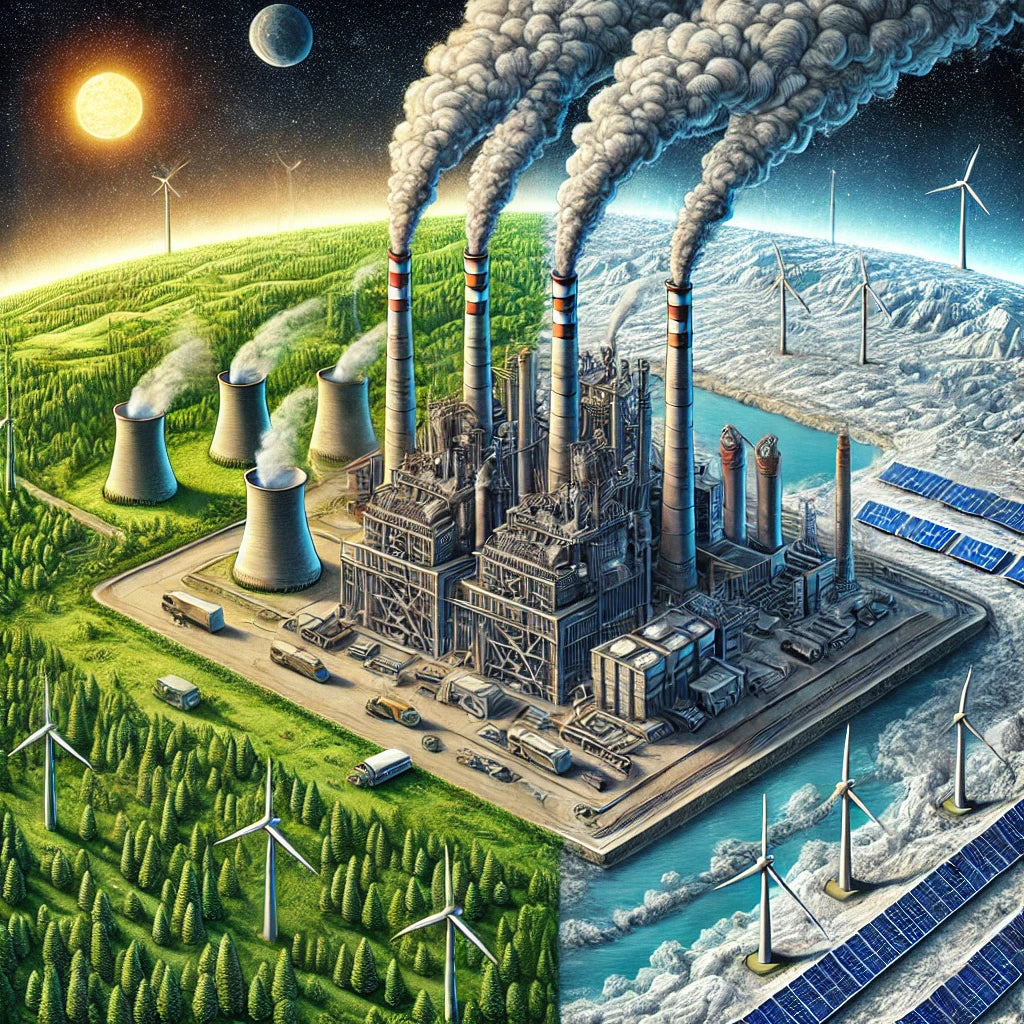
How Fossil Fuels Contribute to Climate Change
Fossil fuels have played a significant role in our world for over a century. They power our cars, heat our homes, and even generate electricity for many of our devices. However, their impact on the environment has become a growing concern. Fossil fuels like coal, oil, and natural gas contribute to climate change, which affects ecosystems, weather patterns, and the future of life on Earth.
In this blog post, we’ll take an in-depth look at how fossil fuels contribute to climate change and discuss actionable ways to reduce our reliance on them. We'll also answer frequently asked questions to help clarify the impact of fossil fuels on our climate.
What Are Fossil Fuels?
Fossil fuels are natural resources formed from the remains of plants and animals that lived millions of years ago. Over long periods, these remains were buried under layers of earth and rock, transforming into coal, oil, and natural gas through heat and pressure.
Types of Fossil Fuels
- Coal: Mainly used for electricity and heat generation.
- Oil: Commonly used in transportation, like fuel for cars and planes.
- Natural Gas: Often used for heating and electricity generation.
Each type of fossil fuel releases carbon dioxide (CO₂) and other greenhouse gases when burned. These emissions trap heat in the atmosphere, leading to global warming.
How Fossil Fuels Cause Climate Change
The primary way fossil fuels contribute to climate change is through the release of carbon dioxide and other greenhouse gases. These gases create a “greenhouse effect,” which traps heat and raises the Earth’s temperature.
The Greenhouse Effect: A Quick Overview
The greenhouse effect occurs when greenhouse gases, like CO₂, methane (CH₄), and nitrous oxide (N₂O), trap heat from the sun in Earth’s atmosphere. This process keeps the planet warm enough to support life, but excessive amounts of these gases disrupt the balance, causing temperatures to rise.
The Role of Fossil Fuels in Greenhouse Gas Emissions
When fossil fuels are burned, they release large amounts of CO₂ and other greenhouse gases. Here’s how different fossil fuels contribute to emissions:
- Coal: The largest emitter of CO₂ among fossil fuels.
- Oil: Used widely in transportation, releasing CO₂ and other pollutants.
- Natural Gas: Although it burns cleaner than coal and oil, it still emits CO₂ and can leak methane, a potent greenhouse gas.
Impact of Fossil Fuel Emissions on the Climate
-
Rising Global Temperatures
Higher concentrations of greenhouse gases in the atmosphere have led to an increase in average global temperatures. This warming effect impacts ecosystems, melts polar ice, and contributes to extreme weather events like hurricanes, droughts, and floods. -
Ocean Acidification
Oceans absorb about 30% of the CO₂ emissions produced by fossil fuels. This absorption causes oceans to become more acidic, impacting marine life and disrupting ocean ecosystems. -
Biodiversity Loss
Climate change caused by fossil fuel emissions affects animal and plant habitats, leading to the loss of biodiversity. Species that cannot adapt or migrate may face extinction.
Reducing Our Dependence on Fossil Fuels
Addressing climate change requires reducing our reliance on fossil fuels. Here are a few actionable steps that individuals, businesses, and governments can take:
1. Transition to Renewable Energy Sources
Renewable energy sources like solar, wind, and hydroelectric power produce energy without emitting greenhouse gases. Investing in and supporting renewable energy can help reduce our reliance on fossil fuels.
2. Energy Efficiency
Improving energy efficiency in homes, buildings, and appliances can help lower energy consumption and reduce greenhouse gas emissions. Simple actions like using LED lights, installing insulation, and upgrading to energy-efficient appliances make a big difference.
3. Embrace Electric Vehicles (EVs)
Transportation is a significant source of CO₂ emissions. Switching to electric vehicles, which produce zero tailpipe emissions, can substantially reduce our carbon footprint. Governments and businesses can also invest in EV charging infrastructure to make this transition easier for individuals.
4. Support Carbon Capture and Storage (CCS)
Carbon capture and storage technologies can capture CO₂ emissions from fossil fuel combustion and store them underground, reducing the amount of CO₂ released into the atmosphere.
5. Advocate for Government Policies
Government policies play a crucial role in regulating emissions and promoting clean energy. Supporting policies that limit carbon emissions, incentivize renewable energy, and set targets for emission reductions can create long-term positive impacts.
FAQs
1. Why do fossil fuels contribute to climate change?
Fossil fuels release large amounts of CO₂ and other greenhouse gases when burned. These gases trap heat in the atmosphere, causing global warming and disrupting weather patterns and ecosystems.
2. What are the main types of fossil fuels?
The main types of fossil fuels are coal, oil, and natural gas. Each of these fuels releases greenhouse gases that contribute to the greenhouse effect when burned.
3. How does coal impact climate change compared to other fossil fuels?
Coal is the largest emitter of CO₂ among fossil fuels, making it a major contributor to climate change. While natural gas emits less CO₂, it can leak methane, a more potent greenhouse gas.
4. Can natural gas help reduce emissions?
Natural gas burns cleaner than coal and oil, producing less CO₂. However, it still contributes to emissions and can leak methane. Transitioning entirely to renewables remains the most effective way to reduce greenhouse gases.
5. What can individuals do to reduce fossil fuel use?
Individuals can reduce fossil fuel use by conserving energy, using public transportation, investing in energy-efficient appliances, and supporting renewable energy solutions.
Conclusion
Fossil fuels have been a cornerstone of industrial progress, but their environmental impact is undeniable. Reducing our reliance on these fuels is critical to combatting climate change. By embracing renewable energy, improving energy efficiency, and advocating for policy changes, we can work together to protect our planet.
We hope this post has provided a clearer understanding of how fossil fuels contribute to climate change and the steps we can take to make a difference.